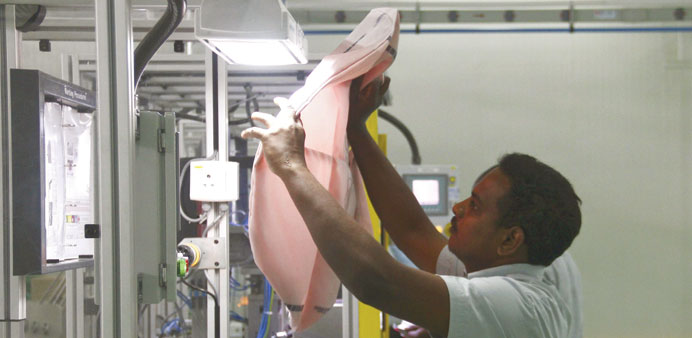A worker examines an airbag inside a factory of airbag maker Rane TRW Steering System Ltd at Singaperumal Koil in Tamil Nadu. By 2020, overall revenues from airbag sales in India are set to rise 11% a year to hit $2bn, outpacing the 9% growth expected in China.
Reuters/New Delhi
The world’s largest airbag suppliers are setting up plants and ramping up capacity in India, eyeing a $2bn opportunity thanks to tougher rules aimed at improving one of the world’s worst road-safety records.
In India, a person is killed in a road accident every four minutes - 141,000 in 2014 - yet less than a third of the 2.6mn cars sold each year have airbags in this cost-conscious market.
But a planned law that will impose crash test standards by 2017 is creating an opportunity for makers of safety equipment, as cars without airbags will achieve only the lowest safety ratings after tests. That, for the first time, will force consumers to directly consider the risks they run by buying cheap.
By 2020, overall revenues from airbag sales in India are set to rise 11% a year to hit $2bn, outpacing the 9% growth expected in China, according to data from Transparency Market Research. By then, India is expected to be selling over 5mn cars a year.
Some of the world’s largest airbag makers - Autoliv Inc, Takata Corp, TRW Automotive Inc and Toyoda Gosei Co - are already gearing up to cash in.
“(This is a) good time to build capacity and the right time to invest to grow the business,” said Harish Lakshman, managing director of airbag maker Rane TRW Steering Systems Ltd, a joint venture between US-based TRW and India’s Rane Holdings Ltd.
The company opened a new airbag assembly plant in August in southern India with capacity to make 500,000 units a year, investing Rs180mn ($2.7mn).
It expects revenues from the airbag unit to hit Rs3.5bn by 2020, from Rs400mn today.
Toyoda Goesi Minda India, a joint venture between the Japanese company and India’s Uno Minda, which has a 25% market share, plans to increase its capacity by up to six times to 150,000 airbags over the next two to three years, group chairman N K Minda said.
Analysts say others will follow, setting up in India to keep costs as low as possible.
“We expect that within five years the large airbag makers will have a manufacturing hub in India,” said Ayay Bandopadhyay, automotive research analyst at Transparency Market Research.
Airbags in India are expensive mainly because most of the parts, such as inflators, are imported. And without rules imposing their use in a country of poorly maintained vehicles and overcrowded, badly lit and potholed roads, carmakers often opt not to add a costly component that could drive up prices.
“I think we have made automobiles in India too cheap,” said Vijay Chhibber, secretary for the road transport and highways ministry.
“In trying to make everything cheap, if we are going to reduce our safety standard it is not worth it.”
The new rules, part of the Road Transport and Safety Bill, do not directly propose airbags, but instead make crash tests mandatory for new models sold in India from October 2017.
“An airbag is only an instrument of road safety,” Chhibber said. The new rules will be discussed in India’s upper house of parliament Rajya Sabha this year before they become law.
Quality issues will be a concern for carmakers, however.
Japan’s Takata hit headlines after carmakers recalled millions of cars to replace airbags made by the company after some exploded too violently, spraying shrapnel into passenger compartments. Eight deaths and more than 100 injuries have been linked to faulty Takata inflators.
In India, makers including Honda, Toyota and Nissan recalled cars after the Takata defect was reported.
Several carmakers in India, including No 2 seller Hyundai Motor Co, still import air bags.
But Kaushik Madhavan, automotive head at Frost & Sullivan, said even cautious carmakers would eventually have to go local.
“Carmakers have to realise that if they have to offer competitively priced products with all the safety technology, they have to be sourced locally,” he said.

